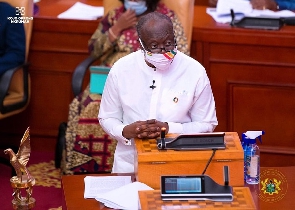Ghana’s hopes of successfully issuing Eurobonds worth between US$3.5 billion and US$ 5 billion early next year were raised last week as its western neigbour, Cote d’Ivore successfully issued US$1.2 billion in Eurobonds.
Ivory Coast’s Eurobond was five times oversubscribed last week, and was sub-Saharan Africa’s first since COVID-19 arrived on the continent in March this year.
Therefore it is seen as a recovery in investor confidence in sub Saharan Africa’s sovereign bond issuances; whereas Eurobond issuances by emerging markets hit a new high during the second and third quarters of this year as countries sought to finance their public policy responses to the spread of the pandemic and its effect on economic activity, no new issuances were done by sub Saharan African countries during the period. that has lagged others in returning to the markets after the shock.
Finance Minister Ken Ofori-Atta announced to Parliament a few weeks ago that Ghana will go to the international capital market early next year – expectedly during the first quarter – to raise at least US$3.5 billion, although it could go as high as US$5 billion if market conditions are favourable; this meaning willingness by investors to buy up the bonds and at rates lower than those currently applicable on Ghana’s Eurobonds already in issue. Most of the money being sought would be used to refinance existing Eurobond debt at a lower servicing cost.
Ghana has proved to be a favourite country in Africa among bond investors; its most recent two Eurobond issuances have been heavily oversubscribed and at coupon rates well below market averages for the region even as it has secured longer tenors than on average for fellow African countries. Indeed last year it issued a tranche of 40-year bonds, the longest tenor issued by a sub-Saharan country to date.
But weaker-rated nations in sub-Saharan Africa may still face higher funding costs than before the coronavirus pandemic, which could discourage their return to markets, Fitch said in a report released on Monday.
“We expect other sovereigns to follow Cote d’Ivoire in issuing Eurobonds in 2021, as market conditions have eased sharply,” Fitch said.
In a sign of improving market sentiment, the JPMorgan Emerging Market Bond Index (EMBI) Global spread for African issuers eased back to below 600 basis points in late November after spiking to more than 1,000 basis points on March 23, Fitch noted.
This means Ghana could secure roughly the same highly favourable terms it got for its latest issuance early this year.
Instructively Ghana opted not to take advantage of a debt relief initiative offered by the G-20 in April this year that would have allowed it to suspend payments on its bilateral foreign debt this year and next year.
Had it accepted the offer Ghana would have saved about US$500 million in debt servicing payments this year but declined because one condition for the offer was that Ghana would not issue any new bonds on the international capital market while the initiative was running.
Namibia, Nigeria and South Africa will likely roll over maturing bonds in 2021 when they fall due, with the trio to conduct further issuance to meet funding needs, Fitch forecast.
Ivory Coast, and Kenya are also expected to return to the markets in 2021, with a possibility that other issuers, such as Benin, could join them, Fitch predicted, given which countries had been expected to launch issues in pre-pandemic 2020.
But sub-Saharan Africa bond issuance may remain lower than in previous years, in part reflecting enhanced official creditor financing, Fitch said, with the International Monetary Fund and other official creditors continuing to provide strong support.
The G20’s Debt Service Suspension Initiative (DSSI), which can include caps on non-concessional funding, could be extended, Fitch added.
The initiative will conserve around US$9.3 billion for Fitch-rated sovereigns in the region in 2020, with its extension to the end of June 2021 providing further support, it said.
Business News of Tuesday, 1 December 2020
Source: goldstreetbusiness.com













